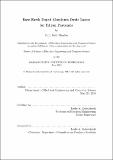Rare-earth doped aluminum oxide lasers for silicon photonics
Author(s)
Magden, Emir Salih
DownloadFull printable version (3.771Mb)
Other Contributors
Massachusetts Institute of Technology. Department of Electrical Engineering and Computer Science.
Advisor
Leslie A. Kolodziejski.
Terms of use
Metadata
Show full item recordAbstract
A reliable and CMOS-compatible deposition process for amorphous Al2O3 based active photonic components has been developed. Al2O3 films were reactively sputtered, where process optimization was achieved at a temperature of 250°C, with a deposition rate of 8.5 nm/min. With a surface roughness of 0.3 nm over a 1 [mu]m2 area, background optical losses as low as 0.1 dB/cm were obtained for undoped films. The development of active photonics components has been realized by use of rare-earth metals as dopants. By co-sputtering aluminum and erbium targets, Er3+ dopants at concentrations on the order of 1.0x1020 cm-3 have been added to the Al2O3 host medium. Resulting Er3+:Al2O3 films have been characterized, and over 3 dB/cm absorption has been measured over a 20 nm bandwidth. Following the material development, distributed Bragg reflector lasers were designed and fabricated in a CMOS foundry. The laser cavity was created by introducing gratings on either side of a Si3N4 waveguide. Er3+:Al2O3 was deposited in SiO2 trenches on top of the Si3N4 layer, eliminating the need for any subsequent etching steps. On-chip laser output of 3.9 [mu]W has been recorded at a wavelength of 1533.4 nm, with a side mode suppression ratio over 38.9 dB.
Description
Thesis: S.M., Massachusetts Institute of Technology, Department of Electrical Engineering and Computer Science, 2014. This electronic version was submitted by the student author. The certified thesis is available in the Institute Archives and Special Collections. 88 Cataloged from student-submitted PDF version of thesis. Includes bibliographical references (pages 61-66).
Date issued
2014Department
Massachusetts Institute of Technology. Department of Electrical Engineering and Computer SciencePublisher
Massachusetts Institute of Technology
Keywords
Electrical Engineering and Computer Science.